Foreign News
From Sudan, the Perils of Bad Manners
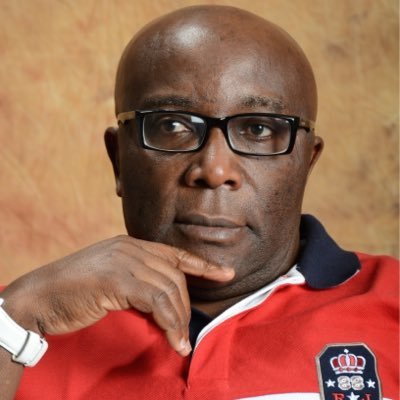
By Chidi Amuta
In a tragic sense, Sudan is somehow lucky. Its leading political figures, who also happen to be combatant generals, have not hidden their differences beneath a façade of mutual deceit. They have instead allowed their differences to blossom into an open bloody confrontation.
When an animosity between two rotten warlords blossoms into a shooting war, it opens the path to either a national meltdown or some kind of settlement. It is either the stronger force subdues the weaker and dictates the terms of a peaceful settlement or an equilibrium of forces is achieved in which case peace through negotiation becomes the only path open to all. In the next couple of weeks, Sudan may have to migrate from the present rage of clashing warlords to a full civil war, yet another in a series since after independence in 1956.
In a little over a week, Khartoum, the capital, has been transformed from a scraggy sprawling city in the sun into the battlefield of an undeclared civil war.
A contest for power supremacy between two corrupt ambitious generals has reopened the window for familiar military adventurism. The bloody rivalry between the two topmost senior military and political leaders has exploded into a real combat situation between factions of the Sudanese military and security forces. War planes, tanks and other weapons of war are being used freely as troops shoot into civilian population centres in Khartoum and beyond.
The raging confrontation is between the forces of General Abdul Fattah al-Burhan, Commander of the Sudanese Army, against those of General Mohamed Hamdan Dagalo, commander of the Rapid Support Force (RSF), a paramilitary security force. Both are semi autonomous forces competing for pre-eminence in the post al- Bashir era. Both men happen to be the topmost political figures, Head and Deputy respectively, in an interim semi military government presiding over the country after a series of shifting power arrangements after the toppling of Omar al Bashir in a 2019 coup led by both men.
Both men also staged a coup that wrested power from the revolutionary civilian coalition of civil society groups whose protests facilitated the ousting of al-Bashir’s three decades of Islamist authoritarianism.
The raging bloody confrontation has degenerated into a blood bath. Casualties have mounted and order has collapsed. Close to 300 deaths have been reported with over 3,500 injured. Most of the victims are innocent civilians and international workers according to independent journalists and observers.
The diplomatic community has been badly hit with United Nations offices and diplomats’ residences openly ransacked and looted. Disturbing cases of open harassment of female diplomats have been reported. Attempts by the international community to broker a cessation of hostilities has led to two failed ceasefires that collapsed within minutes of being announced.
The African Union (AU) has, as usual, been generous with condemnations of the violence with a basket of resolutions and threats, calling on both sides to come to the negotiating table. The United Nations has in turn joined in ritual condemnations of the fighting and its tragic fallouts. Meanwhile, the hostilities are assuming the character and dimensions of a full blown civil war.
The origins and drivers of the resurgent violence in Sudan go beyond a mere interpersonal power tussle between the two very corrupt and ambitious political and military overlords. It goes down to the strategic issues and factors that have always defined the country’s existence and recurrent crises. The primary conflict is that between a growing popular democratic wave and the long standing conservative Islamist power establishment that was the basis of the three decades long Omar al-Bashir hegemony. The pro- democracy forces led the 2018 street protests and revolution that helped topple Omar Al Bashir’s 30 year autocracy remain alive. They had started with agitations and street protests for greater accountability and a better standard of living. Pitted against this nascent populist democratic wave is the conservative Islamist power core of the Sudanese state. The current power structure led by both Generals Hamdani and Dagalo are thinly disguised factions of the al-Bashir regime.
It would be recalled that the popular uprising softened the al Bashir autocracy for toppling by the military. In turn, the two dueling generals staged a coup that upstaged the popular revolution, refusing to cede power to the leadership of the popular movement.
In many ways, a perennial power tussle between factions of the usurping military leaders has become the centerpiece of Sudan’s political life in recent times. It has consistently sidestepped the transition to popular democracy which remains the major issue in the post al-Bashir era. The compromise that legitimized the now crumbling semi military administration remains an attempt to forge a tenuous balance of ambitions between these two dominant forces on the one hand and the popular civil society coalition on the other.
Predictably, therefore, the appearance of uneasy political stability that would lead to the planned democratic elections later in two years was more an appearance than a reality. It has now burst into the bloody confrontation on display in and around Khartoum. It is unlikely that the two dueling generals and their followers will be willing to sheath their swords for as long as they still have forces and formations under their respective command and control. Already, deal to subsume the paramilitary Response Force under the larger umbrella of the Sudanese Armed Forces has fallen apart.
Strategically, Sudan’s peculiarities may escalate the present confrontation. The interplay of internal political interests may be overwhelmed by international conspiracies and interests occasioned by a convergence of Sudan’s strategic location and internal composition.
The United States has always seen Sudan as something of a precarious and suspicious rogue nation that needs to be constantly kept under watch because of its deep Islamic leanings and sporadic terrorist affinities. Sudan was for a long time a hiding place for jihadist terrorist and fundamentalist organizations associated with a long tradition of anti-Western activism.
These range from Yassir Arafat’s temporary refuge in Sudan in the days of the Black September organization. Similarly, al-Queda found refuge in Sudan in its formative years leading President Bill Clinton to send cruise missiles to bomb suspected terrorist havens in Sudan in the run up to the emergence of Osama Bin Laden.
As a result, the two opposing tendencies in the global Islamic world have sought and found allies within the Sudanese political leadership. At different times, Iran and Saudi Arabia as well as their client states and allies in the Middle East have courted different regimes in Sudan. Even now, major interests in the Middle East are tending to support either of the two warring generals. Egypt and Libya have assumed opposing alliances in the ongoing confrontation.
At the present time, the Russians have emerged to further complicate an already complex scenario. They have seen an opportunity in the establishment of a naval base in Sudan as an opportunity to counter long standing US and Western influence in Sudan. Similarly, the Saudi’s remain interested in exploiting the political fluidity in the Sudan to advance their interests. Others like Egypt, Libya and the UAE have of late weighed in in a running jostle for regional influence and pre eminence. Sudan’s neighbours like Egypt, Ethiopia, Eritrea, South Sudan and even smaller African authoritarian regimes all have an interest in the contest for supremacy among Sudan’s ambitious and politicized military leaders.
As it turns out, contrary to the prevalent notion that Sudan is merely a vast arid semi desert country, the country actually contains 10 percent of the arable and fertile land mass of Africa. In addition, it has an abundance of natural resources. Its oil reserves are the main attraction for an increasing Chinese presence in the country. It also has abundant gold and uranium resources in which both its immediate neighbours and major international players are deeply interested. Therefore, there is a convergence of international interest in the current instability in Sudan which may make the confrontation degenerate into a full-blown civil war with deeply interested external players intent on finding lasting foothold.
For the international community especially both the United Nations and the African Union, a quick resolution to the sudden violent eruption in Sudan is now imperative before the parties ossify into combatant footholds with friends abroad. Sudan should be more than a casual engagement. The international community will have to untangle the web of complex interests that are at play in the Sudanese crisis. The Sudan crisis calls for the highest display of diplomatic dexterity to sufficiently assuage the interests and reassure the combatants. A ceasefire leading to dialogue is the only way out. A quick resolution is imperative if the escalating humanitarian tragedy is not to worsen. Most importantly, the challenge in Sudan is first and foremost that of restoring the original sanctity of the civil society coalition that pressured al Bashir out of power.
This should be quickly followed by the restoration of civil authority through a democratic election and return to civil rule. Continuing to sweep the prodemocracy current under the carpet of warlords can only prolong the crisis and plunge Sudan into yet another avoidable civil war. Sudan is boiling from an urgent desire for genuine democracy, not the superficial contest of the huge ego of ambitious war mongers and power oligarchs.
For Nigeria, the evolving tragedy in Sudan has far-fetched repercussions. The United States initiative with its special military mission in AFRICOM will be in peril if Sudan crumbles in an all out civil war. Sudan holds a delicate geographical place in the international effort to contain the spread of jihadist terror in the Sahel.
Happily, the Nigerian political landscape has evolved beyond the point where politicised generals have privatized commands that can be used to hold the nation to ransom. It is perhaps a happier place to be in the hands of rough political entrepreneurs than be caught in a cross fire between armed warlords funded by the state.
Foreign News
CAF Sanctions Kenya Again over Crowd Trouble

The Confederation of African Football (CAF) has sanctioned African Nations Championship (CHAN) co-host, Kenya, for the second time in as many weeks over security breaches.
In a statement made available on Monday evening, the continental governing body said that it has limited entry to the 48,000-seat Moi International Sports Centre.
It also said that, known as Kasarani Stadium, can accommodate 27,000 fans for Sunday’s Group A match between Kenya and Zambia.
CAF said only electronic ticket holders would be allowed into the stadium, with thermal tickets prohibited.
The governing body warned that Kenya’s matches could be relocated from Kasarani Stadium if organisers fail to prevent further breaches.
“We trust these measures will be applied swiftly to protect competition’s integrity, ensure fan safety, and uphold confidence in Kenya’s commitment to the tournament,” CAF said.
The sanctions follow incidents on Aug. 10 when Kenya defeated two-time winner Morocco 1-0 in spite of playing the entire second half with 10 men.
The win put Kenya top of Group A with seven points.
The debutants would reach the quarterfinals with at least a draw against winless Zambia.
Last week, Kenya’s football federation was fined nearly 20,000 U.S. dollars for security lapses during the team’s 1-0 win over DR Congo in the tournament opener on Aug. 3.
In the latest case, CAF cited major lapses, including stadium gates and restricted service areas being overrun by ticketless spectators and holders of government-distributed physical tickets.
It also accused security personnel of losing control at exit points and allowing breaches of the perimeter fence that enabled thousands of ticketless fans to enter.
CAF had expressed alarm over the use of tear gas and flash grenades, reports of live ammunition fired near spectators and staff, and violent incidents such as stone-throwing at security personnel.
It also cited unsafe vehicle movement in spectator areas, inadequate police response, and the lack of medical incident reports in spite of injuries being reported.
Organisers were further criticised for insufficient communication tools and the absence of CCTV coverage at critical entry points.
Foreign News
Madonna Urges Pope Leo to Visit Gaza

Pop icon Madonna has made an appeal to Pope Leo XIV, urging him to visit the blockaded Gaza Strip amid a starvation crisis that has sparked international outrage.
“You are the only one of us that cannot be denied entry,” the U.S. singer wrote on social media platform X late on Monday.
“We need the humanitarian gates to be fully opened to save these innocent children.
“There is no more time,” she added.
Marking the 25th birthday of her son Rocco Ritchie on Monday, Madonna also announced plans to donate to humanitarian organisations working in Gaza.
“I feel the best gift I can give to him as a Mother is to ask everyone to do what they can to help save the innocent children caught in the crossfire in Gaza,” she wrote.
A United Nations (UN) agency said late last week that “acute malnutrition among children in Gaza has reached the highest levels.”
In July alone, nearly 12,000 children lower than five in age were identified as acutely malnourished, with another 2,500 found to suffer from severe acute malnutrition.
According to the UN Office for the Coordination of Humanitarian Affairs (OCHA), this is the most life-threatening form.
Israel controls access roads to Gaza and has sealed off the coastal area.
Very little aid got into Gaza from March through May, when Israel began allowing in deliveries using a controversial private system that bypasses traditional UN agencies.
Under pressure from allies, Israel recently began permitting larger convoys into the territory, as aid airdrops take place overhead.
On Sunday, Irish rock band U2 issued a stinging critique of the Israeli government’s actions.
“We know Hamas are using starvation as a weapon in the war, but now so too is Israel and I feel revulsion for the moral failure,” frontman Bono wrote.
Foreign News
Putin Bans Foreign-made Clothing for Russian Army From 2026

Russian President Vladimir Putin signed a decree on Monday banning the procurement of foreign-made clothing and related gear for the country’s armed forces starting in 2026.
According to the decree, from Jan. 1, 2026, all uniforms and other clothing items for the Russian Armed Forces must be produced by Russian companies whose manufacturing facilities are located within the country.
By 2027, the requirement would extend to fabrics and knitted materials used in production, which must be domestically manufactured.
The measure aims to entirely exclude the purchase of foreign-made clothing and materials for the needs of the military, the decree said.
Military clothing and gear include uniforms, insignia, underwear, bedding, special clothing, footwear, equipment, and sanitary items.
Such supplies are procured through the Russian state defence order system.







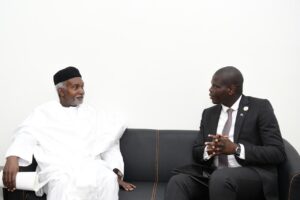

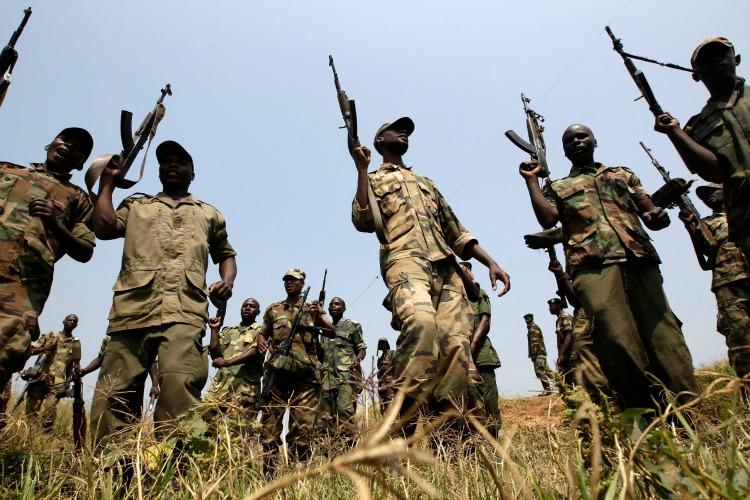
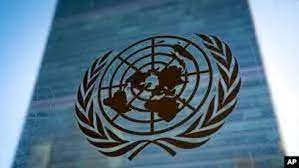








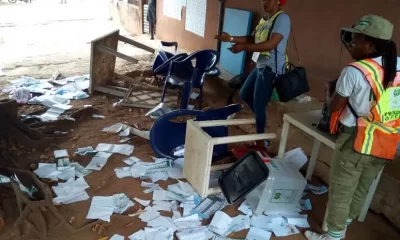

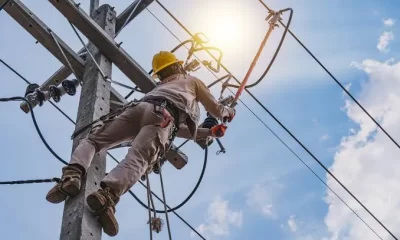








Pingback: Abduction: I-CSPJ Tasks I-GP on Release of Female Journalist in Rivers Daily Asset Online